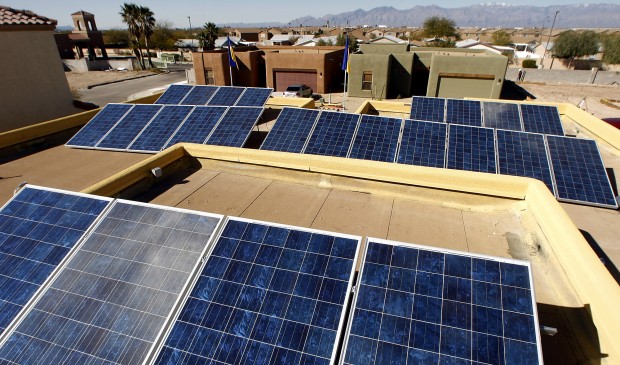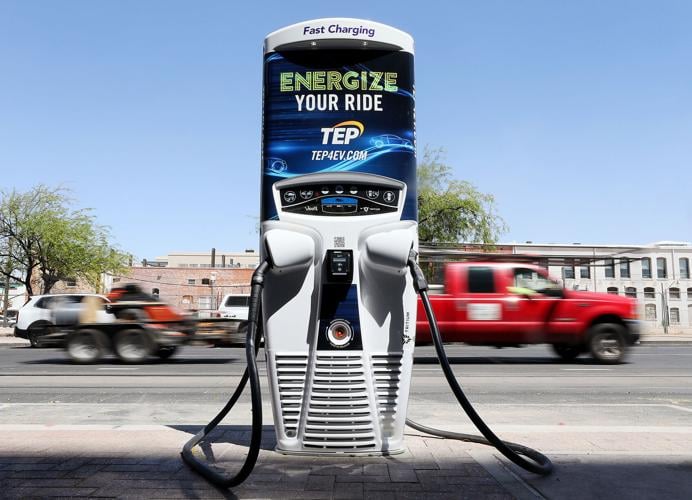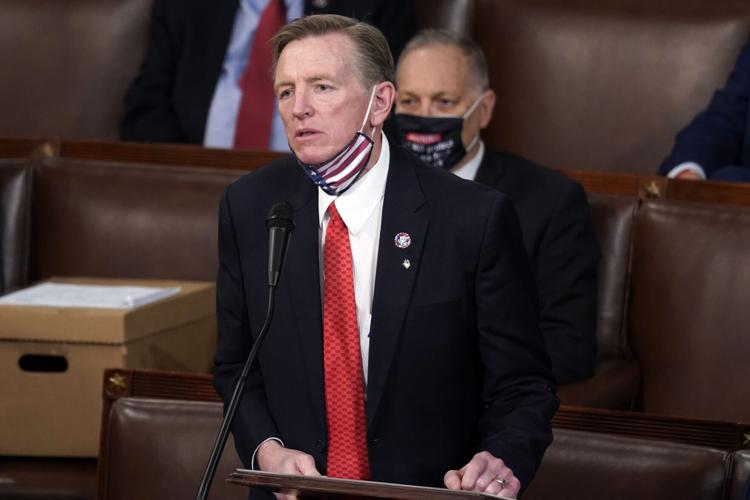The Inflation Reduction Act turned a year old last week, but the political conflict over its future is still boiling, and the debate over its merits isn’t receding.
The act passed Congress last year with support from all Democrats and opposition from all Republicans in both chambers. It contains a host of provisions aimed at raising taxes on the wealthy and reducing healthcare costs for seniors.
But the biggest splash — and most polarizing debate — has come over its clean energy provisions, which are expected to bring at least $10 billion in short-term subsidies and private investments to Arizona and $369 billion nationally in federal investments and tax breaks.
While Democrats, environmentalists and other clean energy activists are celebrating the act’s first anniversary with birthday cakes and tributes to President Biden for pushing the act through, Republicans, who now control the House of Representatives, continue to try to weaken or remove the act’s clean energy provisions.
At least four proposed fiscal 2024 appropriations bills now pending in the House would restrict some Inflation Reduction Act programs as part of what party leaders say is a no-holds-barred attack on federal spending.
These efforts face major hurdles because Democrats control the Senate, and Biden could veto any repeal. But the intensifying opposition underscores the fragility of the president’s agenda under a divided government — and the stakes for Biden’s signature achievement entering the next election, the Washington Post recently reported. Environmentalists have decried these measures as “poison pill riders,” saying the Republicans are carrying out the wishes of their “polluter donors.”
The website Politico reported last week that several Republican presidential candidates, led by ex-President Donald Trump, have blasted the act, and Politico speculated that a change of administrations could lead to a weakening or elimination of the act’s key provisions.
Arizona impacts
The act has already sparked, accelerated or given financial heft to plans for 13 new clean energy manufacturing projects in Arizona alone. Plans are afoot to invest around $8 billion in private capital to build three factories — one in the Tucson area — to manufacture batteries for electric vehicles and for energy storage in buildings.
Nearly $2 billion in federal grants for clean energy efforts have been awarded due to this act and an earlier federal infrastructure bill. At least hundreds of millions of dollars are likely to pour into Arizona in federal rebates and tax credits to help people buy solar panels, heat pumps, electric appliances, home weatherization equipment and electric vehicles.
Conservatives nationally and in Arizona have decried such spending as wasteful and economically non-productive and diversionary.

Republicans, who now control the House of Representatives, continue to try to weaken or remove the Inflation Reduction Act’s clean energy provisions. Some have argued that certain programs are wasteful and subject to little oversight.
But a prominent Arizona State University economist, Dennis Hoffman, says he finds a “very rational case” for the Biden administration’s clean energy programs.
The opposition case has been articulated forcefully by the Wall Street Journal’s conservative editorial page, which has published at least three editorials criticizing the act in recent months.
On the act’s first birthday of Aug. 16, the Journal editorialized the act’s “climate subsidies” will invariably cause “investment distortions and unseen economic damage.” Other editorials, citing various private consultant studies, have predicted that the act’s ultimate cost to taxpayers will be far greater than the Biden administration has projected.
“The IRA is the heart of Bidenomics, which is about creating a new political-subsidy economy. Perhaps all of this will effloresce into a brilliant green future. More likely hundreds of billions in misallocated investment will reduce future productivity gains and translate into slower economic and income growth,” the Journal wrote last week.
Hoffman, in an interview with the Star, said the Journal makes a fair point, but he still sees a role for federal investment in clean energy. That’s because he believes private investment in such projects is unlikely to be enough to get them on firm financial footing.
Gosar explains opposition
Hoffman, director of the L. William Seidman Research Institute at the W. P. Carey School of Business, worked on a major study a few years ago for the liberal Center for American Progress about Biden’s earlier Build Back Better legislation. More expansive and sweeping in its financing of clean energy projects, that act never saw the light of day in Congress but is considered a precursor of the Inflation Reduction Act.
Hoffman’s view is “If you build a program, if you do it through infrastructure and sound programs and build productivity, with things that support education, transportation and other infrastructure, they can have a large, lasting positive impact.”
He acknowledged, however, that if the government simply sends money and drives capital in particular directions without a purpose or a point, it can lead to large inefficiencies.
“The issue becomes: Is this a place where we can and should be spending government money or is this a place where we can sit back and let the market drive capital investments to their best pursuits?” Hoffman said.
“The problem is there’s no immediate payoff for investments in climate that will be attractive to a significant amount of the private sector. A lot of this has to take place as a result of altruistic motivation or long-term investments where people see 10 to 15 years down the road that these investments will pay off.
“And so there is, arguably I think, a role for government investment here. That’s what Biden and those who champion this particular agenda are doing. It’s a very rational case, because without incentives for battery manufacturing plants or electric vehicle supplies or other, related energy efficient infrastructure, capital might not flow to those pursuits,” he said.
The Star contacted four of the five Arizona Republicans in Congress to get their reactions to IRA grants and programs in the state. Only U.S. Rep. Paul Gosar, who represents Prescott and other parts of central, western and northern Arizona, responded. Rep. Juan Ciscomani, whose district includes much of Tucson and Cochise County, declined to comment. Reps. Debbie Lesko and David Schweikert didn’t respond to requests for comment.
“The so-called Inflation Reduction Act has increased inflation and interest rates are the highest they have been in 16 years,” Gosar said in a written statement. “This was predicted at the time of passage. Spending another $1.2 trillion does not reduce inflation. It causes inflation and it has. As for the subsidies and corporate pay offs, I’d rather see the American people benefit from government programs instead of corporate welfare,” he continued.
A big battery manufacturing factory that will employ 1,000 people through a $1.25 billion investment is under construction in his district, in Buckeye, west of Phoenix. The U.S. Department of Energy awarded the project an $850 million construction loan this year.

Rep. Paul Gosar, R-Ariz., says of the Inflation Reducation Act: "Spending another $1.2 trillion does not reduce inflation. It causes inflation. ... As for the subsidies and corporate pay offs, I’d rather see the American people benefit from government programs instead of corporate welfare."
The factory hasn’t changed Gosar’s mind about the Inflation Reduction Act, even though its builder, Kore Power, has said the act gave the project an “incredible lift” with tax breaks for the manufacture of battery cells it will produce.
“I welcome all businesses to Arizona and my district. It is not federal handouts that make Arizona a great place to live and do business. It is the conservative policies, low taxes and ease of doing business here,” Gosar said.
“Biden’s radical green agenda serves to deepen our dependence on foreign sources of energy and weaken our economy,” he added.
The inflation rate has declined significantly since the act was passed, although economists attribute that mainly to higher interest rates imposed by the Federal Reserve Board and to declines in prices for gasoline and other commodities.
Nationally, Republicans have argued that some programs funded through the IRA are wasteful and subject to little oversight, the website Roll Call reported. House Republicans have also made revocation of billions of dollars for initiatives funded by the act a condition of their willingness to finance the federal government overall in fiscal year 2023-24 and avoid a government shutdown, the Washington Post reported.
ASU economist’s analysis
To ASU economist Hoffman, the debate over the Inflation Reduction Act is less about immediate job impacts and more of a bigger picture argument “about whether or not it makes sense to spend money to redirect capital to try to address these concerns on climate? Or do we just sit back and let the market direct capital?”
He said Arizona gas prices have skyrocketed to more than $5 per gallon at times in the Phoenix area in part because of a a lack of investments in fossil fuel infrastructure such as oil refineries and pipelines. But he recalled that intense public opposition, sparked by concern about potential oil leaks and spills, killed plans 15 to 20 years ago for an oil refinery in the Yuma area.
“If we want $3 to $4 gas, we need refineries in proximity to us. But the vast majority of people here didn’t want that 20 years ago, so we don’t have it,” he said.
He added that if the concerns over climate change and devastation of the planet are real — “and I’m not a climate scientist but I’m also not a doubter” — and if the result of these investments is to mitigate some of the negative effects, a rational case can be made that these are wise investments. That’s particularly “in a state like Arizona that is at risk for climate change in terms of the temperatures we reach these days,” he said.
If all investment decisions are left to private markets, we can look for a continuation of past trends, he said, noting, “When we lowered tax rates in the ’80s, a lot of (the tax savings to businesses) flowed to Asia. That was the most productive place to put capital, to build high-efficiency microprocessor plants.
“Where would you rather have capital flow in the United States? To build more refineries, or green technologies?”
President Joe Biden proclaimed Wednesday his administration is “turning things around” for Americans when it comes to the economy, with his signature climate, health care and tax package giving people “more breathing room” on prices and investing anew in clean energy jobs. “We're leaving nobody behind,” Biden told a packed East Room filled with lawmakers, advocates and people who have benefited from his economic policies. “We're investing in all of America — in the heartland, and coast to coast.” His remarks, delivered on the anniversary of the so-called Inflation Reduction Act, came as the White House ramped up efforts to illustrate the real-world impact of Biden's economic plans.






